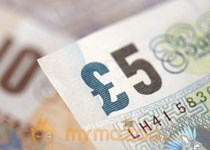Pound Hits Near Six-Year Low Against Dollar
Sterling is on the slide amid worries over the economy and inflation looking likely to remain low as oil falls below $33 a barrel.
The pound has slipped to a near six-year low against the US dollar as prospects of a UK interest rate hike fade amid gathering gloom for the domestic and world economies.
Sterling was trading below $1.46, at its lowest level since May 2010, and was also sharply lower against the euro.
The fall is good news for UK manufacturers trying to sell their goods at competitive prices for export but less welcome to holidaymakers as their pound will buy them less in foreign currency.
It comes a day after forecasts for UK growth in the fourth quarter of 2015 were revised lower as figures showed the expansion in the dominant services sector slowed last month.
The pound had spiked during the summer at above $1.59 as expectations grew of an early interest rate hike by the Bank of England.
Bank governor Mark Carney did little to dampen the speculation at the time when he said that the decision on a rates rise would come into sharper focus around the turn of the year. Rates have remained on hold at the historic low of 0.5% since March 2009.
But with inflation remaining close to zero, prospects for a rise in 2016 still look some way off, especially with the price of Brent crude sliding further to a near 12-year low at under $33 a barrel.
Meanwhile the UK economic picture has since become more gloomy, with disappointing growth and earnings figures.
Fears of a slowdown in China, the world's second biggest economy, have also weighed on global sentiment.
Chancellor George Osborne is warning of a "dangerous cocktail" of risks abroad or higher spending at home.
It all points to continued inaction by the Bank of England even though central bankers in the US have already started lifting rates from near-zero levels after it had also slashed them during the recession.
Howard Archer, chief UK and European economist at IHS Global Insight, said: "The pound has weakened as expectations of a Bank of England interest rate hike any time soon have waned and there has also been a mounting market focus on the UK's referendum on EU membership.
"Expectations of an interest rate hike have been pushed back by recent mixed UK economic data, a relapse in earnings growth and the likelihood that inflation will stay lower for longer due to oil prices falling to new lows.
"The pound's weakening is very welcome news for UK exporters who have found sterling's strength as a major handicap in recent times, and it will boost hopes that economic growth can finally become a little less dependent on domestic demand.
"Of course, the weaker pound is less good news for UK holidaymakers and businessmen going abroad, particularly to the US."







